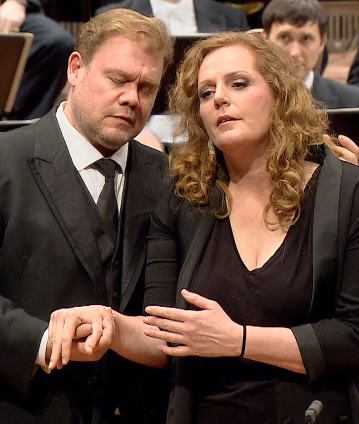“Tristan und Isolde” with Simon Rattle, Eva-Maria Westbroek and Stuart Skelton

No greater love is conceivable than that between Tristan and Isolde. But although Richard Wagner conveys yearning and ecstasy in unparalleled intensity in his opera, what’s lacking is any of the effortlessness of happiness – the tragic end is woven into the music right from the outset. After performances at the 2016 Baden-Baden Easter Festival, Sir Simon Rattle presented the complex work with Eva-Maria Westbroek and Stuart Skelton in the Berlin Philharmonie.
Richard Wagner’s opera Tristan und Isolde was premiered in Munich in 1865 and is based in its outline on a medieval epic poem. He called it a “drama in three acts”– for all intents and purposes a paradoxical designation, given that the work is characterised precisely by the fact that remarkably little happens on the surface. In all three acts it is primarily related what has happened before the curtain rises: be it Tristan’s murder of Isolde’s bridegroom and his inauspicious mission to bring the daughter of the Irish king whom he loves to a former vassal of her father, and the resulting inner conflicts of the two main figures (First Act); be it the disputes that Isolde – by now the wife of King Marke – has with her handmaid Brangäne about the reliability of her lover’s friends (Second Act); be it the attempts of Tristan’s servant Kurwenal to alleviate the hallucinations of his feverish lord by telling him what happened since Tristan walked into the open sword of Melot, who has remained devoted to the cuckolded Marke (Third Act).
If, every now and then, major events leave their traces in the events on stage in Tristan und Isolde – for instance, the decision that actually gets the drama going is only supposedly a decision by Tristan and Isolde to put an end to their lives (First Act), the discovery of the couple’s nightly tête-à-tête and the resulting duel (Second Act) and Isolde’s delayed and thus ineffective arrival at Tristan’s castle (Third Act) – all these are negotiated completely undramatically by Wagner, away from the centre of interest. A concert performance of the opera would seem to do justice to the composer’s intentions, as he ventures into musically previously “unheard of” dimensions to a particular degree with his Tristan. Especially considering that Eva-Maria Westbroek and Stuart Skelton in the title roles head up a top-class ensemble of singers.
© 2016 Berlin Phil Media GmbH
Related interviews
Category
Artists
Our recommendations
- Simon Rattle conducts Wagner’s “Götterdämmerung” at the Festival d’Aix-en-Provence
- “La Damnation de Faust” with Simon Rattle, Joyce DiDonato and Charles Castronovo
- A magical Ravel concert with Simon Rattle
- Sir Simon Rattle conducts Wagner’s “Die Walküre”
- Simon Rattle conducts “Porgy and Bess”
- Kirill Petrenko conducts Strauss’s “Elektra”